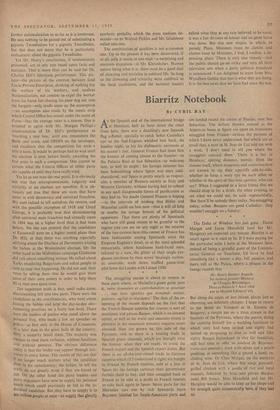Biarritz Notebook
By CYRIL RAY
Ar the Spanish end of the international bridge at Hendaye, half an hour down the coast from here, there was a dazzlingly new Spanish flag a-flutter, specially to catch Senor Castiella's eye as the Sud-Express whisked him back, on Sunday night, to lay his diplomatic successes at his master's feet. General Franco had done him the honour of coming almost to the frontier—to the Palacio Real at San Sebastian—to welcome him, as well he might : his foreign minister has been hobnobbing where Spain was once cold- shouldered, and Spain is pretty nearly as respect- able a member of Western society as Italy and Western Germany, without having had to submit to any such disagreeable forms of purification as they had to. No doubt General Franco is hoping —in the intervals of wishing that Hitler and Mussolini could see him now—that it will all help to soothe the savage breasts of his political opponents. That there are plenty of Spaniards who have still good reason to be grateful to the regime you can see on any night at the smarter of the two casinos here (this corner of France has been fashionable among Spaniards since the Empress Eugenie's time), or at the most splendid restaurants, where handsome hard-faced men, tailored to a turn, the glitter of their single eye- glasses outshone by their wives' blazingly authen- tic emeralds, wash down trufiled goose-liver pâté from the Landes with Latour 1950.
* * *
The smuggling season is about to reopen in these parts where, as Michelin's green guide puts it, 'entre douaniers et contrebandiers se pouriuit . . . une lutte sportive qui demande astuce, patience, agilite et resistance.' The date of the re- opening of the season depends on the fact that the French-Basque appetite for touron, a sort of marzipan, and gateau Basque, which is an almond tartlet, as well as for mate aux amandes (trout is plentiful in the mountain streams) requires more almonds than are grown on this side of the Pyrenees, and so there is a roaring trade in Spanish green almonds, which are brought over the frontier when they are ready, to avoid the French import and the Spanish export duties. But there is an all-the-year-round trade in German cameras which (if I understand it right) are bought in France by French tourists, sold at a loss in Spain for the foreign currency their government forbids them to buy, and then smuggled back to France to be sold at a profit to French tourists to take back again to Spain. Spare parts for the Mercedes cars run by rich Spaniards leave Bayonne labelled for South-American ports and are landed round the corner at Pasajes, near San. Sebastian. The dollars thrown around at the American bases in Spain are spent on transistors smuggled from France—devices the purpose of which I have never understood, but which are so small that, a man in St. Jean de Luz told me with a wink, 'I don't need to tell you where the smugglers conceal them.' There is a bar in Hendaye, spitting distance, merely, from the douane itself, where douaniers and contrebandiers are known to sip their aperitifs side-by-side, whether to keep a wary eye on each other or whether in the spirit of that hate sportive, who can say? When I suggested to a local friend that we should drop in for a drink, the other evening, to see what we could see, he said, reproachfully, 'But there'll be nobody there today. No smuggling today, either. Basques are good Catholics : they wouldn't smuggle on a Sunday.'
The Duke of Windsor has just gone : Dame Margot and Jayne Mansfield (and her Mr. Hargitay) are expected any minute. Biarritz is as smart again as it used to be. If I were paying for the particular suite I have at the Miramar here, instead of being a grateful guest of the Commis- sariat General au Tourisme, I'd have to find something like a tenner a day, full pension, and more still at the Palais, where a plaque in the lounge records that Mr. Henry Herbert Asquith fut nomme premier Ministre de l'Empire Britannique Dans cc Palais le 7 Avril 1908 par sit Majeste Edouard VII.
But along the coast, or just inland, places just as charming are infinitely cheaper. I hope to return to the Hotel du Trinquet at St. Etienne de Baigorry, a simple inn on a trout stream in the foothills of the Pyrenees, where the patron, doing the cooking himself for a wedding luncheon to which sixty had been invited and eighty had turned up proposing to dine as well and (like eighty Basque Jorrockses) to stay for breakfast, still had time to offer us jambon de Bayonne, truite mix amandes, duck with olives and a peach pudding, at something like a pound a head, in- cluding wine. Or Chez Margot, on the outskirts of St. Jean de Luz, where fish soup, piperade, grilled chicken with a paella of rice and local mussels, followed by fruit and giiteati Basque, costs 800 francs. Miss Mansfield and her Mr. Hargitay would be able to keep up her shape and his strength quite economically here, if they had to.


































 Previous page
Previous page